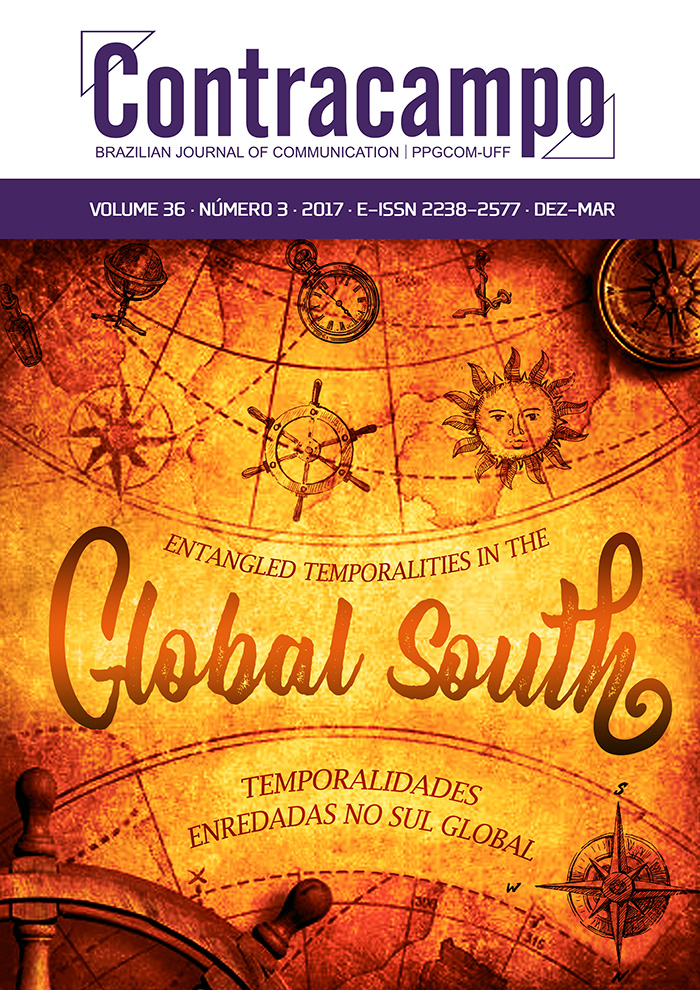A internet como espaço moral: uma análise dos "ensinamentos" do Deboísmo
DOI:
https://doi.org/10.22409/contracampo.v36i3.1039Palavras-chave:
Deboísmo, Moralidade, Internet.Resumo
Este trabalho toma como objeto de estudo o deboísmo, um “movimento” difundido nas redes sociais, que prega a “doutrina” do “ficar de boa” e dissemina seus ensinamentos por meio da linguagem típica da internet, usando memes e imagens humorísticas. Partindo da premissa de que a mídia possui um papel importante na articulação de dilemas éticos, o objetivo do trabalho é contribuir para a compreensão de algumas das características assumidas pelos preceitos morais que se desenvolvem e circulam na internet. Em termos teóricos, o artigo aborda a relação entre mídia e moralidade e as características da moralidade contemporânea. Em termos empíricos, a pesquisa envolve a análise da qualidade estética e da agência moral (Chouliaraki, 2008) dos mandamentos do deboísmo publicados na página de mesmo nome no Facebook (www.fb.com/deboismo).Downloads
Referências
AHMED, Sara. Cultural politics of emotion. Edinburgh: Edinburgh University Press, 2014.
BOYD, danah. Why youth (heart) social network sites: The role of networked publics in teenage social life. In: BUCKINGHAM, D. (org.) Youth, Identity, and Digital Media, p. 119–142. Cambridge: MIT Press, 2008.
CHOULIARAKI, Lilie. The media as moral education: mediation and action. Media, Culture & Society, v. 30, n. 6, p. 831-852, 2008.
______. The ironic spectator: Solidarity in the age of post-humanitarianism. New York: John Wiley & Sons, 2013.
DEUZE, Mark. Media life. Nova Iorque, Polity, 2012.
LIPOVETSKY, Gilles. A Felicidade Paradoxal. São Paulo: Companhia das Letras, 2007.
______. O crepúsculo do dever. Lisboa: Dom Quixote, 1994.
MACINTYRE, Alastair. After virtue. Notre Dame: University of Notre Dame Press, 2007.
RECUERO, Raquel. Redes sociais na internet. Porto Alegre: Sulina, 2009.
______. A conversação em rede. Porto Alegre: Sulina, 2012.
SILVERSTONE, Roger. Por que estudar a mídia? São Paulo: Loyola, 2002.
______. Media and morality. Londres: Polity Press, 2007.
TAYLOR, Charles. As fontes do self: a construção da identidade moderna. São Paulo: Loyola, 2005.
______. A secular age. Cambridge: Harvard University Press, 2007
TURKLE, Sherry. Alone Together. New York: Basic Books, 2011.
VAZ, Paulo. O destino do fait divers: política, risco e ressentimento no Brasil contemporâneo. Revista FAMECOS, v. 1, n. 35, 2008.
ZIZEK, Slavoj. O hedonismo envergonhado, caderno Mais!, Folha de São Paulo, 19 de outubro de 2003.
Downloads
Publicado
Edição
Seção
Licença
Os autores retêm os direitos autorais e concedem à revista o direito de publicar o seu trabalho pela primeira vez sob a licença Creative Commons (CC-BY), que permite o intercâmbio de obras e reconhecimento de autoria na revista.


